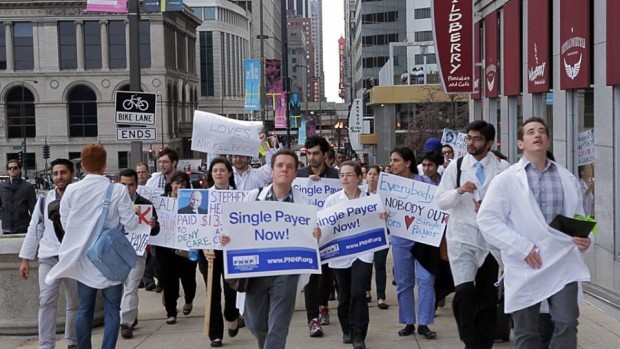I feel like I need to start off this post with an apology: to all the wonderful teachers I had growing up: I’m sorry. I have done you a great disservice. It’s not because I was an insufferable know-it-all (although I definitely was), or because I often ignored your sage advice (also guilty).
No, I want to apologize for myself, my colleagues, and for the medical community as a whole: we have been stealing from you, for years now, and are leaving you without the resources necessary to do your job. The same goes for public defenders, social workers, affordable housing advocates, and countless others. Our medical costs are growing at a totally unsustainable rate while investment in every other area has cratered, and we’ve let it happen.
Take my home state Massachusetts as an example. In 2001, we spent 31% of our state budget on health care. This coming year, we’re expecting to spend 45% (almost half!) of our budget on health care. That is completely unsustainable, and is crowding out spending in other crucial areas. Education? Sorry teachers, you’ve gone from 23% to 17%, and are actually receiving less money in real terms than you were in 2001. The story is the same everywhere else. Legal aid? Down $700 million in real terms. Housing and economic development? Stagnant, despite a growing population, rising rents, and gentrification.

Across the country, rising health costs are bankrupting states, and states are responding by cutting back on social services. This has been a disaster. By overspending on health care, we have not invested in affordable housing, the lack of which makes people sick. By not investing in education, we are holding our children back from attaining their full educational and vocational potential, putting them at higher risk for obesity, chronic disease, and an early death.
Thus, by spending more money on health care, we are paradoxically spending less on the things that keep us healthy. In order to fund the social interventions needed to promote health, we need to control health spending. Our country has tried countless different remedies to control costs, always with the same result: failure. If HMOs have not slowed private health spending and managed care has failed to control Medicaid costs, why should ACOs, pay for performance, or any other of the “next big things” in health policy be any different?
It’s time for our country to finally follow the lead of the rest of the world and adopt policies that have actually been shown to contain costs. A single-payer, Medicare-for-All system would immediately save money by cutting hospital administrative costs (potentially saving $150 billion per year) and leveraging increased bargaining power to reduce service and prescription drug costs. Additionally, a single-payer system is much better able to control health spending in the long term. For example, Canada and the US spent the same amount on health care in 1966 when Canada enacted its universal Medicare program, but since that point Canadian health spending has grown half as quickly as US spending.
Enough is enough. I’m proud to be a medical student, but for too long our medical system has taken vital resources away from teachers, lawyers, social workers, and countless other sectors. To my medical colleagues, it is time we recognize the vital role our allies play in improving the lives of our patients, and direct our resources to where they are needed to promote health. To my colleagues in education, law, community development, affordable housing, and countless other areas, it is past time that you get the respect and resources necessary to do your jobs. Single payer is the best way to stop health spending from consuming our state and federal budgets, and provide the money for teachers, lawyers, and community developers to do their jobs and help our patients.
Waxing eloquent about the “social determinants of health” is very in right now in medical and public health circles, but such talk is nothing but empty words without the resources to back it up. It’s time for us to put our money where our mouths are, and put an end to the theft of valuable social resources by our broken health care system. Universal health care will not fix all that ails us, but it has to be the first step on the road to a more just society.
Andy Hyatt is a medical student at the Boston University School of Medicine.
